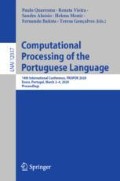Abstract
The presence of misleading content on the web and messaging applications has proven to be a major contemporary problem. This context has generated some initiatives in Linguistics and Computation to investigate not only the informative content but also the media in which this mis/disinformation circulates. This paper describes one initiative, in particular, with satire. We present a linguistic analysis based on Brazilian Portuguese satirical news, seeking to understand how a user receives and shares this type of information and which are the main linguistic characteristics of these comments. We note that, while many users understand satirical content, many use the virtual/social environment to express a general comment about the news subject or even to make a toxic comment about a public person. Through this work, we intend to collaborate with the detection of misleading content and understand the behaviour of the user of social media, avoiding the improper sharing of this kind of news.
Access this chapter
Tax calculation will be finalised at checkout
Purchases are for personal use only
References
Allcott, H., Gentzkow, M.: Social media and fake news in the 2016 election. J. Econ. Perspect. 31(2), 211–236 (2017)
Balage Filho, P.P., Pardo, T.A.S., Aluísio, S.M.: An evaluation of the brazilian portuguese LIWC dictionary for sentiment analysis. In: Proceedings of the 9th Brazilian Symposium in Information and Human Language Technology, Fortaleza, Ceara, Brazil, pp. 215–219 (2013)
Rubin, V., Conroy, N., Chen, Y., Cornwell, S.: Fake news or truth? using satirical cues to detect potentially misleading news. In: Proceedings of the Second Workshop on Computational Approaches to Deception Detection, pp. 7–17. Association for Computational Linguistics, San Diego (2016)
Rubin, V.L., Chen, Y., Conroy, N.J.: Deception detection for news: three types of fakes. In: Proceedings of the 78th ASIS&T Annual Meeting: Information Science with Impact: Research in and for the Community, pp. 1–4. American Society for Information Science, Silver Springs (2015)
Singh, R.K.: Humour, irony and satire in literature. Int. J. Engl. Lit. 3(4), 63–72 (2012)
Tandoc Jr., E.C., Lim, Z.W., Ling, R.: Defining “fake news": a typology of scholarly definitions. Digital Journalism 6(2), 137–153 (2018)
Wardle, C.: Fake news. It’s complicated. First Draft News 16 (2017)
Wardle, C., Derakhshan, H.: Information disorder: toward an interdisciplinary framework for research and policy making. Council of Europe report 27 (2017)
Zaryan, S.: Truth and trust: how audiences are making sense of Fake News. Master’s degree, Lund University (2017)
Acknowledgments
The authors are grateful to CAPES and USP Research Office (PRP 668).
Author information
Authors and Affiliations
Corresponding author
Editor information
Editors and Affiliations
Rights and permissions
Copyright information
© 2020 Springer Nature Switzerland AG
About this paper
Cite this paper
Wick-Pedro, G., Santos, R.L.S., Vale, O.A., Pardo, T.A.S., Bontcheva, K., Scarton, C. (2020). Linguistic Analysis Model for Monitoring User Reaction on Satirical News for Brazilian Portuguese. In: Quaresma, P., Vieira, R., Aluísio, S., Moniz, H., Batista, F., Gonçalves, T. (eds) Computational Processing of the Portuguese Language. PROPOR 2020. Lecture Notes in Computer Science(), vol 12037. Springer, Cham. https://doi.org/10.1007/978-3-030-41505-1_30
Download citation
DOI: https://doi.org/10.1007/978-3-030-41505-1_30
Published:
Publisher Name: Springer, Cham
Print ISBN: 978-3-030-41504-4
Online ISBN: 978-3-030-41505-1
eBook Packages: Computer ScienceComputer Science (R0)

